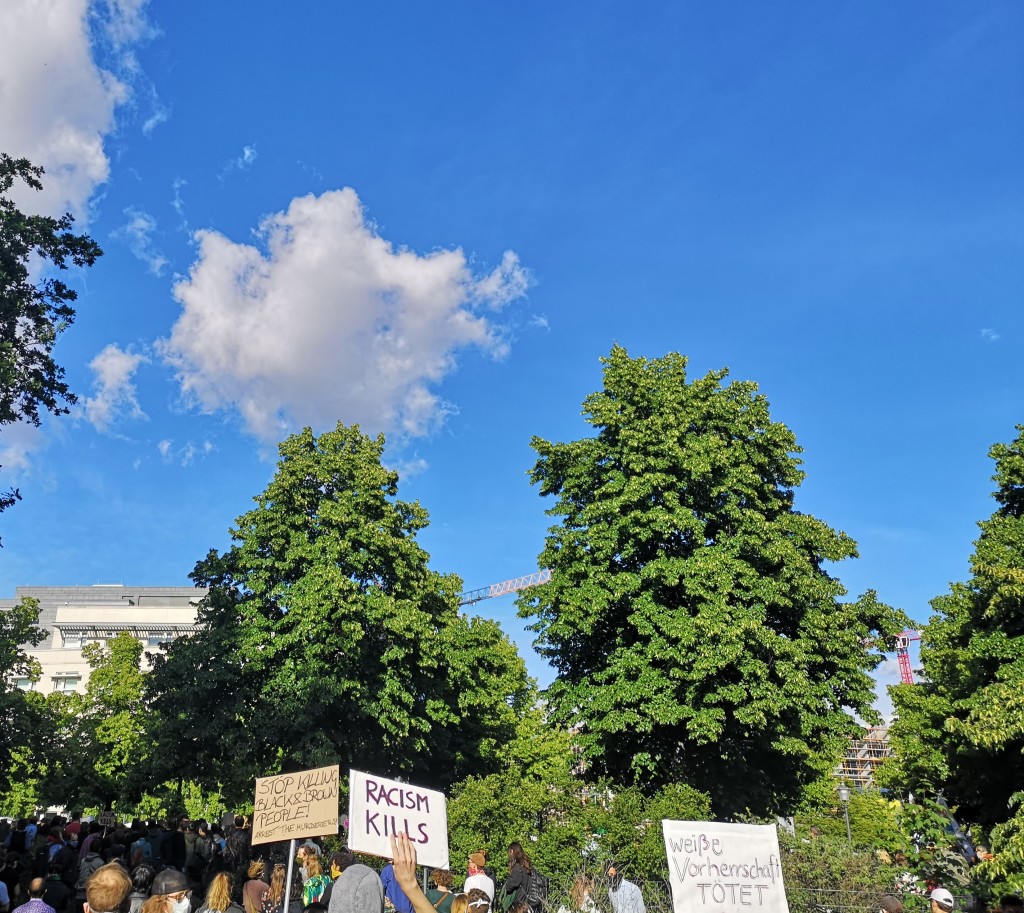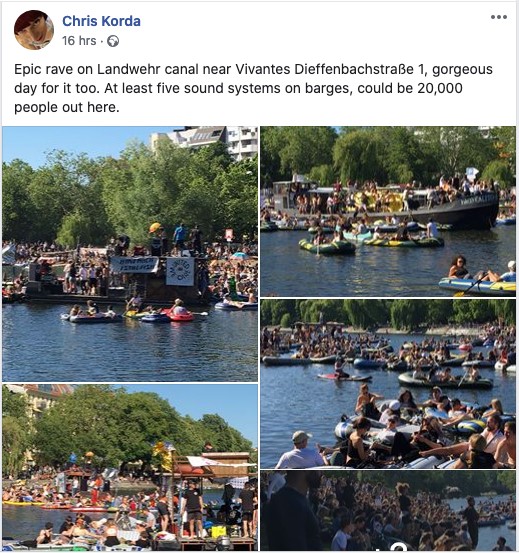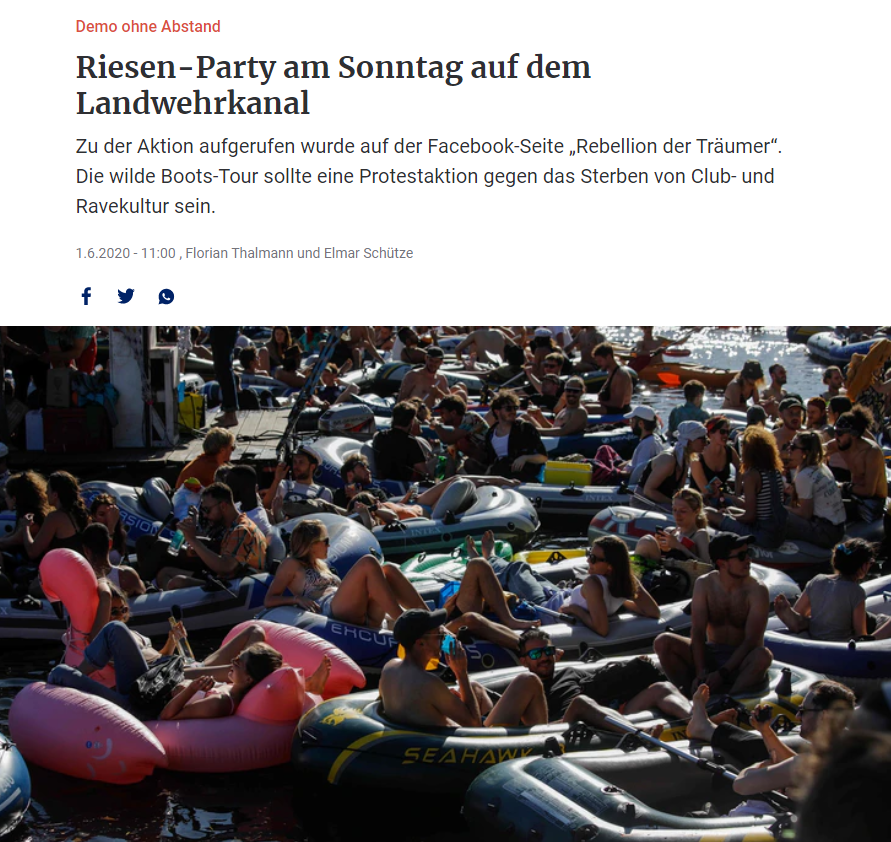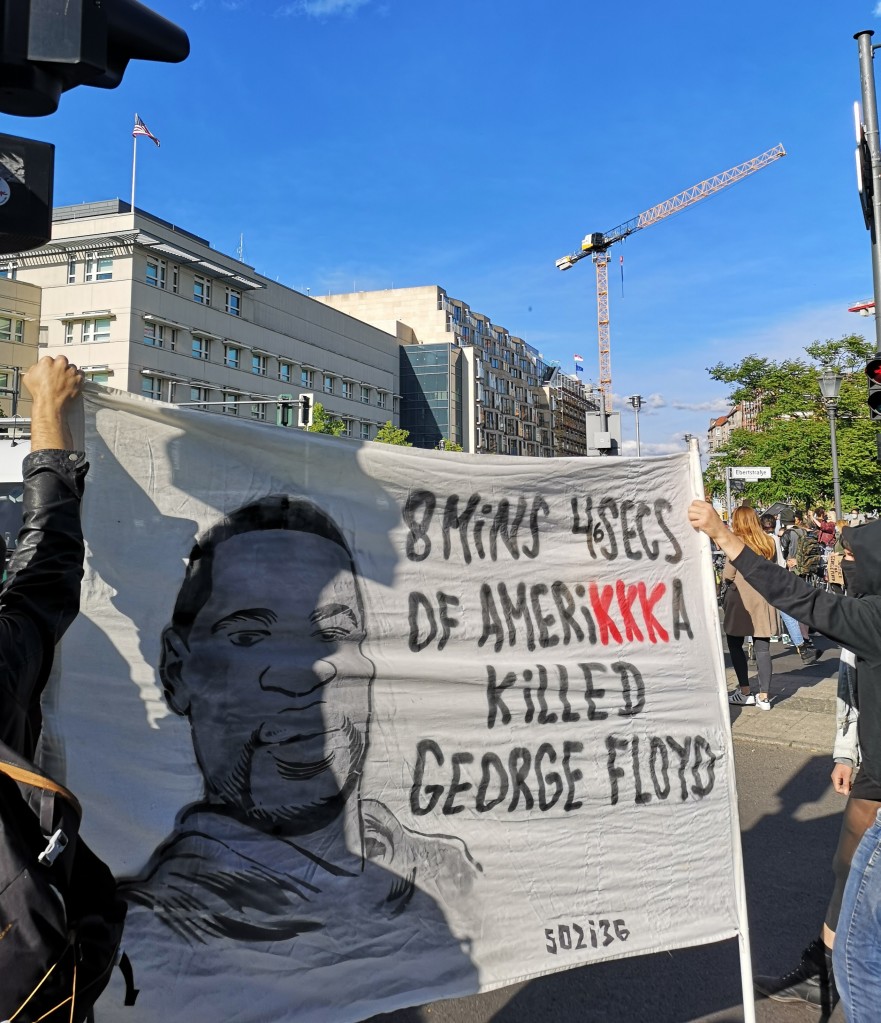A large swath of Berlin’s club scene kicked off the summer with an illustration of how not to respond to a crisis. The message: if the crisis doesn’t apply to me, I won’t acknowledge its existence.
[Editorial]
The resulting image is a warning both to Berlin’s scene and club culture around the world – a choice between doing something that is aware of people around us, or not.
I want to acknowledge that specifically because I think there’s the danger for all of us in music to make poor choices here, especially if we are not in a minority group impacted by persecution or impacted by the virus. And I include myself personally in that danger.
To say we live in challenging times would be an understatement. Uh, let me check my notes here, I’ve go, hmm – pandemic, of course, global economic depression on top of that, looming famine (please don’t forget that one), climate catastrophe (that’s coming with potentially still more extra famines), general racist violence, racist police violence, and break-out fascism and repression. If it weren’t an average daily news cycle in 2020, I think my guess would have been the Old Testament. (There are even plagues of locusts associated with the famines. No frogs… yet. I should check in on news from the Egyptian government.)
Amidst all these novel crises, though, racism and police brutality and institutional inequity are the ones that aren’t novel. And we have tons of existing activism we can support. We don’t need the answers; politically-minded music scene members have the stupidly easy chance to support people who have always worked tirelessly on this, whether or not it happens to be trending headline news.

Is this relevant to music? Absolutely. Music’s place has always been bound up with politics and protest. Is it part of electronic music and club culture? I mean, yeah – absolutely. When we talk about party culture as a safe space, discrimination and police brutality are among the principal forces people are trying to escape. They’re the very freedom the party is about.
And normally you’d expect Berlin to be a central hub, amplifying that political message. It’s not like most people came here for the natural landscape or some love of German bureaucracy. They came with some utopian dreams. That’s as true for music tech as it is music. That choice can be stark: DSP engineers, for instance, often wind up with the decision to work for the defense industry or make peaceful musical instruments, the latter for far less money. And when German tech relocated here from other parts of the country, it sought some new ways of being, not just parties. (If it were just for parties, all the music gear makers would presumably be headquartered in Ibiza or something.)
The world is watching. Many people look to Berlin, and Berlin’s music scene, for hope.
The community here is diverse, international, and from German to immigrant, tends to futuristic utopian imagination. But the pandemic era has laid bare some of the tensions in that progressivism.
At first, the problem was simply gathering at all. Clubs are closed. Gatherings were generally not allowed. That’s left, at best, people staring into social media filter bubbles instead of coming together. At worst, it’s robbed people of basic economic security – and the most marginalized have as always been most impacted.
Even as restrictions are lifted, there’s a divide in who are visible (out in public) and who are not (those isolating, particularly those with vulnerable health or connections to the vulnerable). The very people most attuned to the dangers of a pandemic are by definition the ones who stay home. The ones who just don’t care about the virus and the people it impacts are the ones who most readily, and most carelessly, head out into the public.
Over the long Pfingsten holiday weekend, though, Berlin has lifted some of these restrictions. Clubs can’t reopen, but protests are again allowed. Yesterday, on Sunday May 31, that created a juxtaposition.
A tale of two protests
An overwhelmingly white, large-scale “protest” occurred along the Landwehrkanal that runs through Kreuzberg. (This video sums up the soundtrack – yes, that’s someone repeatedly coughing.)
https://www.facebook.com/events/709818473167138/permalink/712736179542034/
Reddit thread [Reddit DE]:
Rave in Berlin direkt vor dem Vivantes Klinikum am Landwehrkanal. Was ist mit den Leuten los?
Simultaneously, a march from U-Bahn Mehringdamm in Kreuzberg and along the line of the U7 to Hermannplatz protested the police killings in the USA of George Floyd, Breonna Taylor, Tony McDade, Ahmaud Arbery, and others.
https://www.facebook.com/events/548075652557592/
This followed a Saturday protest at the US Embassy, next to Brandeburger Tor.
For the record: I was at neither Sunday event, but talked with people who were at each. I attended the Saturday rally, as did many CDM friends and partners over the weekend in the US.
But the Sunday “water demo” rave and the march were within a short walk of one another, at the same time.
The “Ravekultur Retten! Wasserdemo – Rebellion der Träumer” – loosely translated, “save rave culture – Water demo – dreamers’ rebellion” – was organized with the support of nightclubs / venues Rummels Bucht, Kater Blau, Salon – Zur wilden Renate, SAGE Restaurant, and Sisyphos, plus booking/artist management agency Sunday Drivers, among others.
There were some noble ideals behind the “rave culture” demonstration. According to the organizers, at least, the intent was to advocate financial support for self-employed artists, culture institutions, and access to health care for marginalized people (part of the #leavenoonebehind / #unitedwecare movement). These may seem obvious in well-off Germany, a country lauded for its response to the pandemic, but it’s not. There has been controversy and confusion over how support funds go to the arts, or if they should receive direct support at all. And Germany has mandatory health care, but not universal public health care.
See Booking United for a similar effort by German booking agencies – which thankfully is on behalf of all workers, not just the ones on their rosters.
For anyone wanting to shame the water ravers themselves, it’s hard to be surprised that a bunch of people came out. Younger people worldwide have often expressed a sense of vulnerability to the virus (whether that’s informed by science or not). And people felt isolated and want to get out and party on a sunny day; if it weren’t for that impulse, we might not be human, and anyone organizing outdoor events would be in a whole lot of trouble. So, of course, a big water rave attracted a bunch of partygoers.
The problem is the venue the protest gave these predictably energized ravers. The point of organizing is, well, organizing that raw energy. And the images of a bunch of white kids casually partying on boats in a crowd now have taken on their own life and narrative.
Updated: Police updates put attendance at 1500, which actually means it was smaller than the anti-racism protests. According to police estimates, 1500 people attended the march Sunday, and 2500 the US Embassy. (See reporting in The Washington Post. I suspect total attendance at the US Embassy may have been even higher, as there was limited space around the embassy where people could here or gather, because of the prominent positioning of police trucks and an unrelated protest at Brandenburger Tor, which also had barricades.) But this makes even more stark the general absence of representation from Berlin’s music and club communities.
Here’s a screenshot of an attendee (direct link, I’ve had trouble with some Facebook embedding lately):

Let’s play “what’s wrong with this picture”
A few things went off the rails here.
The message came across as “reopen the clubs.” Without any acknowledgment of safety, the demo seems to be opposed to government restrictions on clubs, not advocacy for support for cultural workers. It’s “reopen the club,” without the vital original message of supporting the actual people or remembering the people at risk that were the reason they were first closed. It’s just about bringing back the party, which was not the event’s self-described aims.
It’s in front of a hospital. The large open basin on the canal in Kreuzberg/Neukölln happens to be in front of the neighborhood’s largest hospital – Vivantes Klinikum Am Urban. I don’t mean a historical hospital; I mean an active, open hospital. The message is then doubly ageist and ableist. (I was in a hospital for a few days in March in Berlin; I’m a fairly young-ish person and I don’t want you playing tech house outside my window, please.)
Organizers noted this was the endpoint, not the location for the whole protest, but that made it worse – since it funneled crowds and passersby in a heavily-trafficked urban area right in front of the hospital complex.
There was no visible acknowledgment of the pandemic. People I talked to at the Sunday march against police violence said the crowd overwhelmingly wore masks. That was my experience at the event Saturday, too. Both of those events made prominent mention of the need for social distancing and masks, at least in the promotional materials.
The organizers of the rave culture demo appear to have made no such attempt. Participants seem not to have made any effort, either.
Being tonedeaf about the virus is also tonedeaf about race. The absence of acknowledgment of the virus puts the club demo in league with a lot of right wing movements opposed to social distancing and with an apparent disregard for human health and life. But it’s doubly unnerving at this time, with a virus that disproportionately kills people of color – not only African Americans, but also people of other descent. (This isn’t just an “American” problem – it’s evident in the UK, so inside Europe, too. NPR reported on this story just this weekend.)
There was no solidarity with worldwide protests against police violence, or of the role of people of color in Berlin’s music scene. Oh yeah, and then there’s that. It wasn’t only protests in the USA or even Berlin happening this weekend; there were worldwide protests around this issue in support of American protests. And Berlin’s club scene was built together with connections with people of color across a variety of genres from around the world – most famously the Detroit – Berlin techno connection, but across almost every other party, too. That’s to say nothing of concerns about police repression and violence against various minorities and LGBTQ groups in Europe.
They upstaged protests for people of color at a critical moment – and created a disappointing new image for Berlin’s party scene. By organizing such an event, the organizers of the water rave undercut well-attended solidarity events that did happen around race elsewhere in the city. So they didn’t just fail to express solidarity – they stole some headlines. (Happily, international press mostly covered the solidarity protests.)
For instance, here’s reporting from Berliner Zeitung:

Riesen-Party am Sonntag auf dem Landwehrkanal
People I talked to who were on the boats have objected, saying the photos make it look more dangerous than it was. But an easy way to have avoid that image, with eyes on them, would have simply been to wear masks.
I don’t necessarily blame the participants as a party like this was inevitable. But this was an organized demo, which means it is completely fair to blame the clubs. (I would say for letting this get out of hand, but there has to be evidence of effort in the first place.)
If the events hadn’t overlapped, if people had made any effort to maintain distance and health, if there had been any attempt at diversity, the water rave could have been a hopeful, joyous gesture. But timing, context, and presentation are part of meaning.
Organizers can solve these problems. You can buy tons of masks and hand them out, for instance (something I noted even the US Embassy protest failed to do). You can talk to other groups and coordinate with them productively. I was out with an organizer from Beirut; the movement there has managed political organizing in the midst of really tough lockdown and with the threat of starvation and a failed state.
Keep in mind, too, that a lot of organizers in communities of color are actively discouraging members to go out in public protest – including none other than Black Lives Matter itself – because this virus has been so disproportionately deadly for minorities.

Roundly criticized
The verdict regarding the event was swift and unforgiving – and it undercuts the supposed aim of the organizers, to support arts workers.
Here’s how bad this was – people I know who work in club culture, whose rent is paid by club culture, were angry enough seeing these images that they were saying these clubs should never reopen. Like, that bad.
Leil-Zahra Mortada had a damning verdict I’ve seen circulating in my social media feeds today (and, well, yeah):
This comes up in the context of increasing frustration from some artists that clubs, arts organizations, venues, and institutions are being silent on the issue of racism even as it comes to a head in the USA.
Many of those artists live in Europe, not only Americans. For instance, our friend German-born DJ Sarah Farina had this soul-searching thread today:
Also a good thread from Sarah:
And there’s a class divide, too. As The Black Madonna points out, there is a sense that the people with the most financial stability are the ones who are the least active, while people facing serious uncertainty are the most vocal. This sums that up:
This is worth criticizing because any one of us can choose to do better
Berlin here is the image and emblem, but I don’t mean to make this about Berlin, let alone a day of individual protests.
Our music tech community has I feel done something productive in being there for people who are isolated and at home. I have absolutely no qualms about continuing this industry to make musical instruments – or I wouldn’t be in this business. This is a whole other discussion, but I really hope that we go further. The pandemic offers a window into abelism, in that there are many people, from injured to disabled to immuno-compromised, who were already experiencing home confinement. Now we know how much it sucks. We should keep some spirit of solidarity with all those people and try to listen more.
I understand the club community is under particular pressure – without reopening, there just is no security for countless people working in positions from wardrobe to the bar, not only DJs.
But we shouldn’t have to choose between reopening and valuing human life. And we shouldn’t have to be silent on issues of race.
We need to integrate acknowledgment of pandemic-era health into the things we do in public. I’m not saying we have to be perfect – we’re dealing with a new virus and changing science, and we have to make tradeoffs. But we should make effort, and make some visible symbolic awareness of that effort. That’s a pretty low bar; there’s no excuse for failing.
Activism needs to support, not detract from, efforts on behalf of the marginalized. Please consider and listen. People across the music world are facing isolation, uncertainty, and fear. This is a time to come together. Racist and privileged positions do the opposite, period.
Those of us in positions of privilege, let’s, you know, do something to try to actually change things. Here in Berlin, Room 4 Resistance is a queer femme / non-binary forward collective who continue to demonstrate ways that politics and music can constructively overlap. I think they’re worth following; I noticed they were out front on this when other groups (and clubs) were not, or promoted the water rave.
And Dance with Pride, based in Amsterdam but working internationally, has also been persistent. They forward resources from Black Lives Matter for better courses of action and support, specifically aimed at how people who are not an impacted minority can respond:
There’s also a growing document of anti-racism resources, intended to be white people friendly. (That phrase sounds weird, like a Starbucks and a pair of kahki slacks, but you know what I mean. Those of us – myself included – with some privilege, and some need to change.)
This is a marathon, not a sprint. I hope that by the end of there summer, there’s a different image of club culture and Berlin. It’s far from too late to make that happen.
Please, anyone doing organizing work or with something that needs amplification on these issues in music, be in touch. I wanted to share what I know about this weekend in Berlin and to do some of the work of getting this message out there, especially as I know a lot of people are in pain. That does not mean I want to monopolize these issues, even on CDM. And as always, if you have music and musical tools that need attention, keep sending those – those matter now, too, as much as ever.
And do stay healthy and safe.